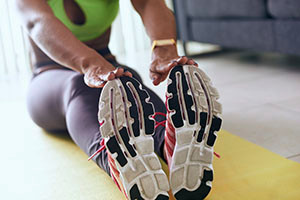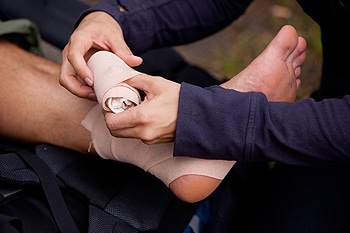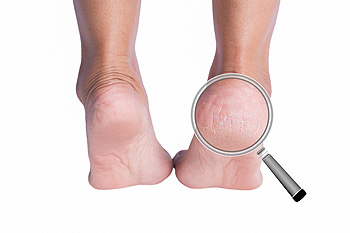Connect With Us
Blog
Items filtered by date: November 2020
Common Foot Injuries May Be Prevented While Strength Training
 When an injury occurs, a runner may feel disappointment at not being able to to run. Common foot problems among runners can include plantar fasciitis and Achilles tendon injuries. There are methods that can be implemented which may help to prevent running injuries. These consist of participating in a strength training routine, which can help muscles become stronger by lifting weights. When the hip abductors are properly trained, the risk of enduring an injury may be diminished. Additionally, it is beneficial to have your running style assessed, as this may help to improve posture. For more information about how to prevent running injuries, it is suggested that you speak with a podiatrist.
When an injury occurs, a runner may feel disappointment at not being able to to run. Common foot problems among runners can include plantar fasciitis and Achilles tendon injuries. There are methods that can be implemented which may help to prevent running injuries. These consist of participating in a strength training routine, which can help muscles become stronger by lifting weights. When the hip abductors are properly trained, the risk of enduring an injury may be diminished. Additionally, it is beneficial to have your running style assessed, as this may help to improve posture. For more information about how to prevent running injuries, it is suggested that you speak with a podiatrist.
All runners should take extra precaution when trying to avoid injury. If you have any concerns about your feet, contact one of our podiatrists of Florida Foot & Ankle Group, P.A.. Our doctors will treat your foot and ankle needs.
How to Prevent Running Injuries
There are a lot of mistakes a runner can make prior to a workout that can induce injury. A lot of athletes tend to overstretch before running, instead of saving those workouts for a post-run routine. Deep lunges and hand-to-toe hamstring pulls should be performed after a workout instead of during a warmup. Another common mistake is jumping into an intense routine before your body is physically prepared for it. You should try to ease your way into long-distance running instead of forcing yourself to rush into it.
More Tips for Preventing Injury
- Incorporate Strength Training into Workouts - This will help improve the body’s overall athleticism
- Improve and Maintain Your Flexibility – Stretching everyday will help improve overall performance
- “Warm Up” Before Running and “Cool Down” Afterward – A warm up of 5-10 minutes helps get rid of lactic acid in the muscles and prevents delayed muscle soreness
- Cross-Training is Crucial
- Wear Proper Running Shoes
- Have a Formal Gait Analysis – Poor biomechanics can easily cause injury
If you have any questions, please feel free to contact one of our offices located in Debary, Lake Mary, Orlando, and Oviedo, FL . We offer the newest diagnostic and treatment technologies for all your foot care needs.
Managing Pain From Peripheral Neuropathy
 Peripheral neuropathy is a condition that causes a reduction or loss of sensation in the lower limbs. Common symptoms of peripheral neuropathy include pain, a pins-and-needles sensation in the lower limbs, numbness, and weakness. Chronic stress can potentially worsen the symptoms of peripheral neuropathy. When experiencing stress, it is important to continue to maintain healthy eating habits and positive social relationships with friends, family, and caregivers to reduce the risk of exacerbating peripheral neuropathy pain. To learn more about how to manage peripheral neuropathy, please speak with a podiatrist.
Peripheral neuropathy is a condition that causes a reduction or loss of sensation in the lower limbs. Common symptoms of peripheral neuropathy include pain, a pins-and-needles sensation in the lower limbs, numbness, and weakness. Chronic stress can potentially worsen the symptoms of peripheral neuropathy. When experiencing stress, it is important to continue to maintain healthy eating habits and positive social relationships with friends, family, and caregivers to reduce the risk of exacerbating peripheral neuropathy pain. To learn more about how to manage peripheral neuropathy, please speak with a podiatrist.
Neuropathy
Neuropathy can be a potentially serious condition, especially if it is left undiagnosed. If you have any concerns that you may be experiencing nerve loss in your feet, consult with one of our podiatrists from Florida Foot & Ankle Group, P.A.. Our doctors will assess your condition and provide you with quality foot and ankle treatment for neuropathy.
What Is Neuropathy?
Neuropathy is a condition that leads to damage to the nerves in the body. Peripheral neuropathy, or neuropathy that affects your peripheral nervous system, usually occurs in the feet. Neuropathy can be triggered by a number of different causes. Such causes include diabetes, infections, cancers, disorders, and toxic substances.
Symptoms of Neuropathy Include:
- Numbness
- Sensation loss
- Prickling and tingling sensations
- Throbbing, freezing, burning pains
- Muscle weakness
Those with diabetes are at serious risk due to being unable to feel an ulcer on their feet. Diabetics usually also suffer from poor blood circulation. This can lead to the wound not healing, infections occurring, and the limb may have to be amputated.
Treatment
To treat neuropathy in the foot, podiatrists will first diagnose the cause of the neuropathy. Figuring out the underlying cause of the neuropathy will allow the podiatrist to prescribe the best treatment, whether it be caused by diabetes, toxic substance exposure, infection, etc. If the nerve has not died, then it’s possible that sensation may be able to return to the foot.
Pain medication may be issued for pain. Electrical nerve stimulation can be used to stimulate nerves. If the neuropathy is caused from pressure on the nerves, then surgery may be necessary.
If you have any questions, please feel free to contact one of our offices located in Debary, Lake Mary, Orlando, and Oviedo, FL . We offer the newest diagnostic and treatment technologies for all your foot care needs.
Are Bunions Affecting Your Everyday Life?
Preventing Falls for Seniors
 Falling is a major cause of injury among older adults. Not only can falls cause physical injury, but they can also psychologically impact the person who has fallen and lead to increased fear of walking and reduced independence. The best way to avoid these issues is to prevent falling in the first place. Some strategies that may help prevent falls around the house include installing grab bars and a shower seat in the bathroom, clearing the stairs, making sure that the steps are visible, tightening any loose handrails, removing excess furniture, cords, or rugs that can lead to tripping, and installing brighter lighting. It may also be beneficial to evaluate the senior’s footwear to make sure it is well-fitted, comfortable, and supportive, and to use a mobility aid such as a cane. For more information about falls prevention, consult with a podiatrist.
Falling is a major cause of injury among older adults. Not only can falls cause physical injury, but they can also psychologically impact the person who has fallen and lead to increased fear of walking and reduced independence. The best way to avoid these issues is to prevent falling in the first place. Some strategies that may help prevent falls around the house include installing grab bars and a shower seat in the bathroom, clearing the stairs, making sure that the steps are visible, tightening any loose handrails, removing excess furniture, cords, or rugs that can lead to tripping, and installing brighter lighting. It may also be beneficial to evaluate the senior’s footwear to make sure it is well-fitted, comfortable, and supportive, and to use a mobility aid such as a cane. For more information about falls prevention, consult with a podiatrist.
Preventing falls among the elderly is very important. If you are older and have fallen or fear that you are prone to falling, consult with one of our podiatrists from Florida Foot & Ankle Group, P.A.. Our doctors will assess your condition and provide you with quality advice and care.
Every 11 seconds, an elderly American is being treated in an emergency room for a fall related injury. Falls are the leading cause of head and hip injuries for those 65 and older. Due to decreases in strength, balance, senses, and lack of awareness, elderly persons are very susceptible to falling. Thankfully, there are a number of things older persons can do to prevent falls.
How to Prevent Falls
Some effective methods that older persons can do to prevent falls include:
- Enrolling in strength and balance exercise program to increase balance and strength
- Periodically having your sight and hearing checked
- Discuss any medications you have with a doctor to see if it increases the risk of falling
- Clearing the house of falling hazards and installing devices like grab bars and railings
- Utilizing a walker or cane
- Wearing shoes that provide good support and cushioning
- Talking to family members about falling and increasing awareness
Falling can be a traumatic and embarrassing experience for elderly persons; this can make them less willing to leave the house, and less willing to talk to someone about their fears of falling. Doing such things, however, will increase the likelihood of tripping or losing one’s balance. Knowing the causes of falling and how to prevent them is the best way to mitigate the risk of serious injury.
If you have any questions, please feel free to contact one of our offices located in Debary, Lake Mary, Orlando, and Oviedo, FL . We offer the newest diagnostic and treatment technologies for all your foot care needs.
The Three Types of Ankle Sprains
 Ankle sprains occur when the ligaments that help hold the ankle bones together are twisted, overstretched, or torn. There are three main types of ankle sprains. A lateral ankle sprain occurs when there is an injury to the ligaments on the outside of the ankle. This is often the result of turning the toes in while pointing them downward during an injury. A medial ankle sprain occurs when there is an injury to the ligaments on the inside of the ankle. This is typically the result of turning the toes out while pointing them upwards during an injury. A syndesmotic sprain occurs when the front or back lower ligaments of the ankle are injured. This can occur from pointing the toes too far up and out during an injury. If you think you may have an ankle sprain, it is suggested that you see a podiatrist. A podiatrist can diagnose your ankle sprain and offer you the right treatments to get you back on your feet.
Ankle sprains occur when the ligaments that help hold the ankle bones together are twisted, overstretched, or torn. There are three main types of ankle sprains. A lateral ankle sprain occurs when there is an injury to the ligaments on the outside of the ankle. This is often the result of turning the toes in while pointing them downward during an injury. A medial ankle sprain occurs when there is an injury to the ligaments on the inside of the ankle. This is typically the result of turning the toes out while pointing them upwards during an injury. A syndesmotic sprain occurs when the front or back lower ligaments of the ankle are injured. This can occur from pointing the toes too far up and out during an injury. If you think you may have an ankle sprain, it is suggested that you see a podiatrist. A podiatrist can diagnose your ankle sprain and offer you the right treatments to get you back on your feet.
Ankle sprains are common but need immediate attention. If you need your feet checked, contact one of our podiatrists from Florida Foot & Ankle Group, P.A.. Our doctors can provide the care you need to keep you pain-free and on your feet.
How Does an Ankle Sprain Occur?
Ankle sprains take place when the ligaments in your ankle are torn or stretched beyond their limits. There are multiple ways that the ankle can become injured, including twisting or rolling over onto your ankle, putting undue stress on it, or causing trauma to the ankle itself.
What Are the Symptoms?
- Mild to moderate bruising
- Limited mobility
- Swelling
- Discoloration of the skin (depending on severity)
Preventing a Sprain
- Wearing appropriate shoes for the occasion
- Stretching before exercises and sports
- Knowing your limits
Treatment of a Sprain
Treatment of a sprain depends on the severity. Many times, people are told to rest and remain off their feet completely, while others are given an air cast. If the sprain is very severe, surgery may be required.
If you have suffered an ankle sprain previously, you may want to consider additional support such as a brace and regular exercises to strengthen the ankle.
If you have any questions please feel free to contact one of our offices located in Debary, Lake Mary, Orlando, and Oviedo, FL . We offer the newest diagnostic and treatment technologies for all your foot and ankle needs.
Healing Cracked Heels
Dry and cracked heels are a common condition that can have a variety of causes, including living in a dry climate, wearing backless shoes, and taking long, hot showers. They can also develop due to age and certain medical conditions, like eczema, psoriasis, and poor circulation. If you have dry, cracked heels, there are things you can do to heal them. Apply a good moisturizer to the heel regularly. Moisturizers with ingredients such as urea, salicylic acid, and lactic acid may help exfoliate and soften the skin. Exfoliating the feet with a pumice stone or scrub can remove dead skin cells. There are also various over-the-counter treatments and orthotic devices available which may help reduce dry, cracked heels by softening the skin and providing extra cushioning. If after home treatment your heels remain dry, or if you have deep, painful cracks, it is suggested that you see a podiatrist for treatment.
If the skin on your feet starts to crack, you may want to see a podiatrist to find treatment. If you have any concerns, contact one of our podiatrists from Florida Foot & Ankle Group, P.A.. Our doctors can provide the care you need to keep you pain-free and on your feet.
Cracked Heels
It is important to moisturize your cracked heels in order to prevent pain, bleeding, and infection. The reason cracked heels form is because the skin on the foot is too dry to support the immense pressure placed on them. When the foot expands, the dry skin on the foot begins to split.
Ways to Help Heal Them
- Invest in a good foot cream
- Try Using Petroleum Jelly
- Ease up on Soaps
- Drink Plenty of Water
Ways to Prevent Cracked Heels
- Moisturize After Showering
- Skip a Shower
- Keep Shower Water Lukewarm
- Don’t Scrub Your Feet
If you are unsure how to proceed in treating cracked heels, seek guidance from a podiatrist. Your doctor will help you with any questions or information you may need.
If you have any questions, please feel free to contact one of our offices located in Debary, Lake Mary, Orlando, and Oviedo, FL . We offer the newest diagnostic and treatment technologies for all your foot care needs.
Blog Archives
- March 2025
- February 2025
- January 2025
- December 2024
- November 2024
- October 2024
- September 2024
- August 2024
- July 2024
- June 2024
- May 2024
- April 2024
- March 2024
- February 2024
- January 2024
- December 2023
- June 2023
- May 2023
- April 2023
- March 2023
- February 2023
- January 2023
- December 2022
- November 2022
- October 2022
- September 2022
- August 2022
- July 2022
- June 2022
- April 2022
- March 2022
- February 2022
- January 2022
- December 2021
- November 2021
- October 2021
- September 2021
- August 2021
- July 2021
- June 2021
- May 2021
- April 2021
- March 2021
- February 2021
- January 2021
- December 2020
- November 2020
- October 2020
- September 2020
- August 2020
- July 2020
- June 2020
- May 2020
- April 2020
- March 2020
- February 2020
- January 2020
- December 2019
- November 2019
- October 2019
- September 2019
- August 2019
- July 2019
- June 2019
- May 2019
- April 2019
- March 2019
- February 2019
- January 2019
- December 2018
- November 2018
- October 2018
- September 2018
- August 2018
- July 2018
- June 2018
- May 2018
- April 2018
- March 2018
- February 2018
- January 2018


